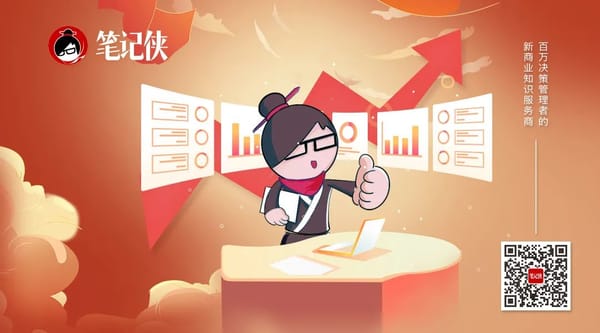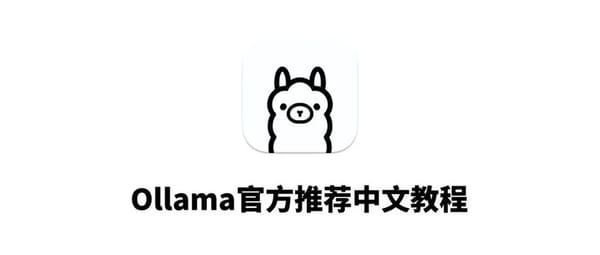What Does It Mean to Touch Grass? Origin, Meaning, and How to Actually Do It
Discover the meaning and origin of touch grass, how it is used online, tone and etiquette tips, plus practical ways to reset offline and make the habit stick.
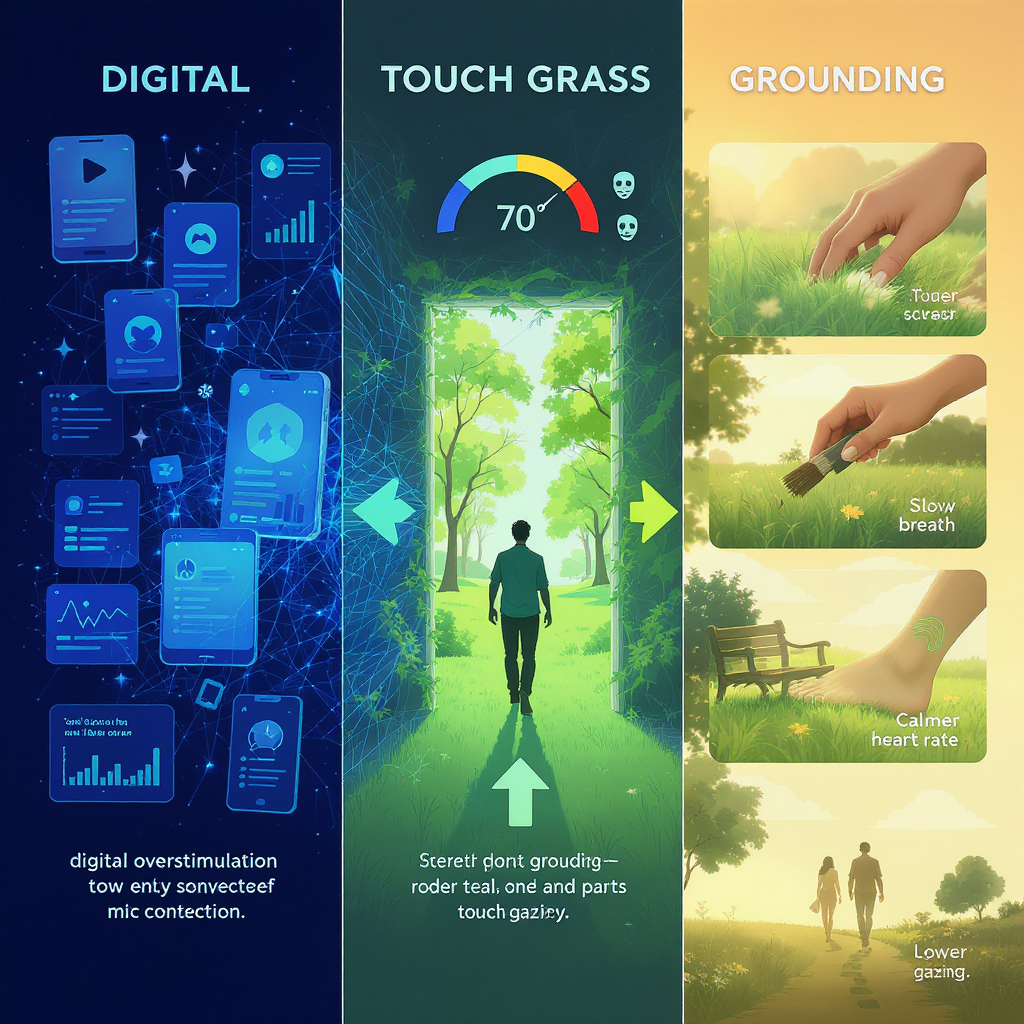
This guide explains what “touch grass” means, where it came from, and how it’s used across online communities today. You’ll find tone and etiquette tips, practical ways to take a quick offline reset, and digital hygiene ideas to make the habit stick without judgment or grand gestures.
What Does It Mean to “Touch Grass”?
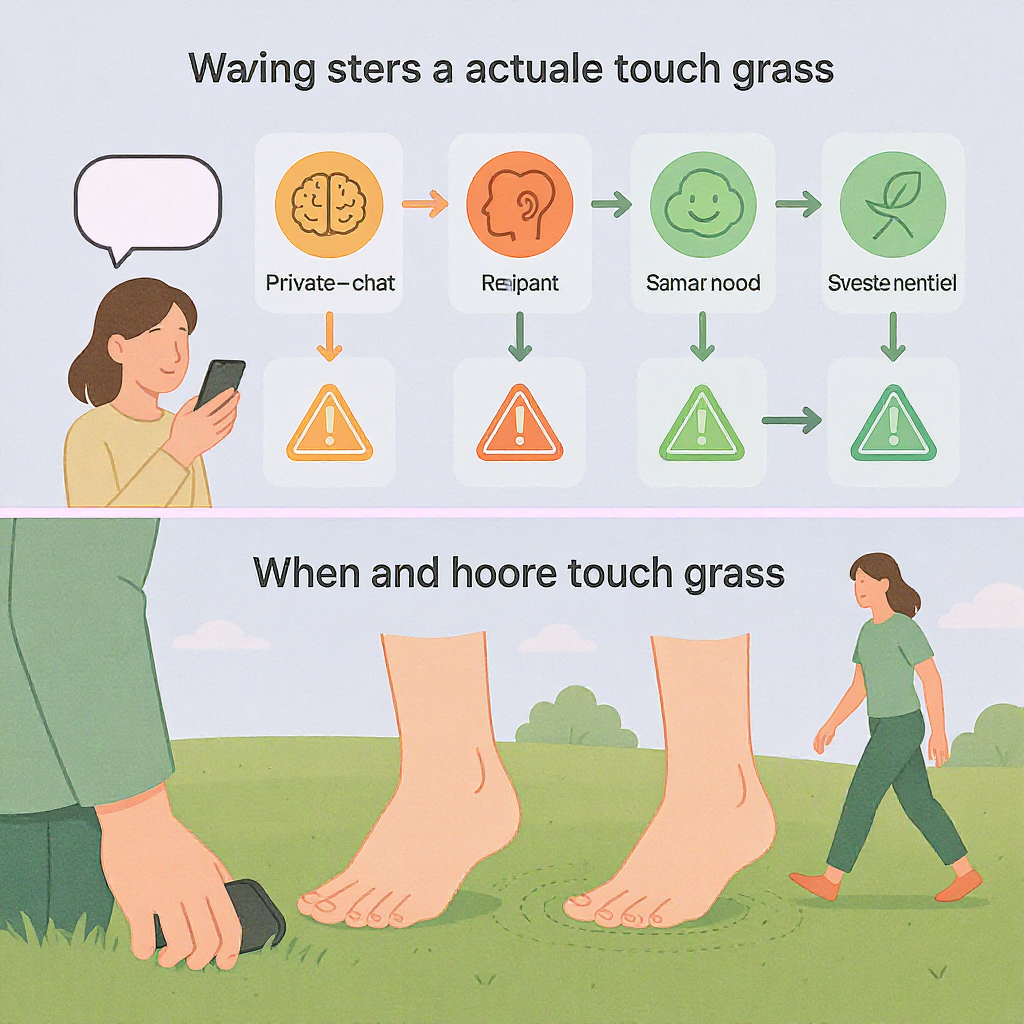

“Touch grass” is internet shorthand for “log off and reconnect with reality.” If you’ve ever wondered, what does it mean to touch grass, the phrase is a playful nudge (or sometimes a harsh clapback) telling someone they seem too immersed in online drama, conspiracies, or endless scrolling and could use a quick dose of offline, real‑world experience.
- The spirit behind it: step away from the screen, feel something tangible, recalibrate your mood and perspective.
- It isn’t always literal. It can mean any short, grounding break outside: step on a balcony, sit by a window, touch a plant, feel the sun, breathe.
Quick examples of how it’s used in replies:
“Bro, it’s not that deep. Touch grass.”
“Take a walk, touch grass, then come back.”
“Friendly reminder to touch grass today, gamers.”The vibe behind “touch grass”
- Light roast: a humorous prompt when someone is spiraling over trivial takes.
- Dismissive put‑down: an attempt to shut down intense, off‑base, or combative posts.
- Self‑aware meme: “I need to touch grass after doomscrolling for 2 hours.”
Origins and Evolution
“Touch grass” emerged from online communities where people spend long hours debating or gaming. While exact origins are hazy, it appears in posts on gaming forums and imageboards in the 2010s and became widespread by the late 2010s into early 2020s, especially on Twitter/X, Reddit, and TikTok.
Why grass? It’s a simple symbol for the offline world: nature, sunlight, textures, bodies moving in real space. Touching grass is a concrete antidote to being “too online.” The phrase dovetailed with pandemic-era screen fatigue and meme culture, spreading as a quick, memeable directive with just enough bite to stick.
As it evolved:
- Gamers used it to deflate rage-quits and meta rants.
- Fandoms wielded it during shipping wars and celebrity discourse.
- Politics and conspiracy threads saw it as a reality check.
- It evolved from literal advice to a versatile meme—a cultural shorthand for “perspective reset.”
How It’s Used Today: Tone and Context
“Touch grass” lands very differently depending on tone, relationship, and topic. It can be funny and grounding—or snide and minimizing.
| Use | Typical Tone | Common Scenarios | Example | When to Avoid | Kinder Alternative |
|---|---|---|---|---|---|
| Playful roast | Light, teasing | Fandom squabbles, gaming hot takes | “Lmao touch grass and re-queue.” | When someone is upset or vulnerable | “Quick break might help. BRB after a walk?” |
| Dismissive put-down | Confrontational | Conspiracy spirals, rage threads | “Touch grass. This is unhinged.” | During serious topics or lived experiences | “This seems heavy. Maybe pause and revisit later.” |
| Self-aware reset | Reflective, humorous | After doomscrolling or a long session | “I’m going to touch grass and hydrate.” | — | “I’ll be back after a walk; need fresh air.” |
Read the room
- Friends vs. strangers: inside jokes can feel like attacks from outsiders.
- Topic sensitivity: mental health, harassment, or systemic issues aren’t “touch grass” moments.
- Medium matters: in text-only spaces, sarcasm is easy to misread; add warmth or clarity.
Why It Resonates
The phrase taps into modern digital overwhelm:
- Too-online drift: long sessions warp priorities; minor takes feel existential.
- Doomscrolling fatigue: constant novelty and negativity overload attention and mood.
- Parasocial loops: intense one-sided bonds with creators/communities can amplify angst.
- Nature as a reset: brief exposure to greenery, daylight, and movement often improves mood and attention. Even two to ten minutes outside can help you feel less jittery and more grounded.
In short, “touch grass” names a felt need: puncturing the infinity of feeds with a sensory check-in.
Etiquette and Sensitivity
When telling someone to “touch grass” backfires:
- They’re sharing trauma, discrimination, health concerns, or safety issues.
- They’re already dysregulated; dismissal can escalate conflict.
- Power dynamics are uneven (e.g., punching down in replies).
How to avoid minimizing real issues:
- Validate before redirecting: “That sounds tough. Might help to take a breather.”
- Offer opt-in breaks: “I’m stepping away for a bit; happy to revisit later.”
- Switch from public dunking to private care if you know the person.
Kinder alternatives:
- “Let’s pause and stretch. I’ll be back in 10.”
- “Quick walk? Then we can look with fresh eyes.”
- “This feels heated—bookmarking to revisit tomorrow.”
Practical Ways to Actually “Touch Grass”
You don’t need a meadow. You need a minute and a plan.
- Micro‑break outside (2–5 minutes)
- Step to a balcony, porch, or doorway.
- Look at the farthest thing you can see to relax eye focus.
- Name 3 colors you see; feel air on your skin.
- Barefoot sensory grounding (3 minutes, if safe)
- Stand on grass, soil, or a textured surface.
- Notice temperature, pressure, and texture underfoot.
- Take 6 slow breaths, longer exhales than inhales.
- Mindful five‑minute walk
- Keep your phone in your pocket; no headphones.
- Walk one block out, one back; count 50 steps in your head.
- Note one smell, one sound, one shape.
- Sunlight + breathwork stack (2 minutes)
- Face daylight; soften your gaze.
- Box breathing: inhale 4, hold 4, exhale 4, hold 4 (repeat 4 times).
- Analog micro‑hobbies to rebalance (10–20 minutes)
- Sketch, knit one row, brew tea, water plants, do a puzzle.
- The goal is tactile, finite, and offline.
A simple script to remind yourself:
If I’ve scrolled for >10 minutes + feel tense,
then pause feed -> step outside -> 6 slow breaths -> water a plant -> return or log off.Digital Hygiene Tips to Support the Habit
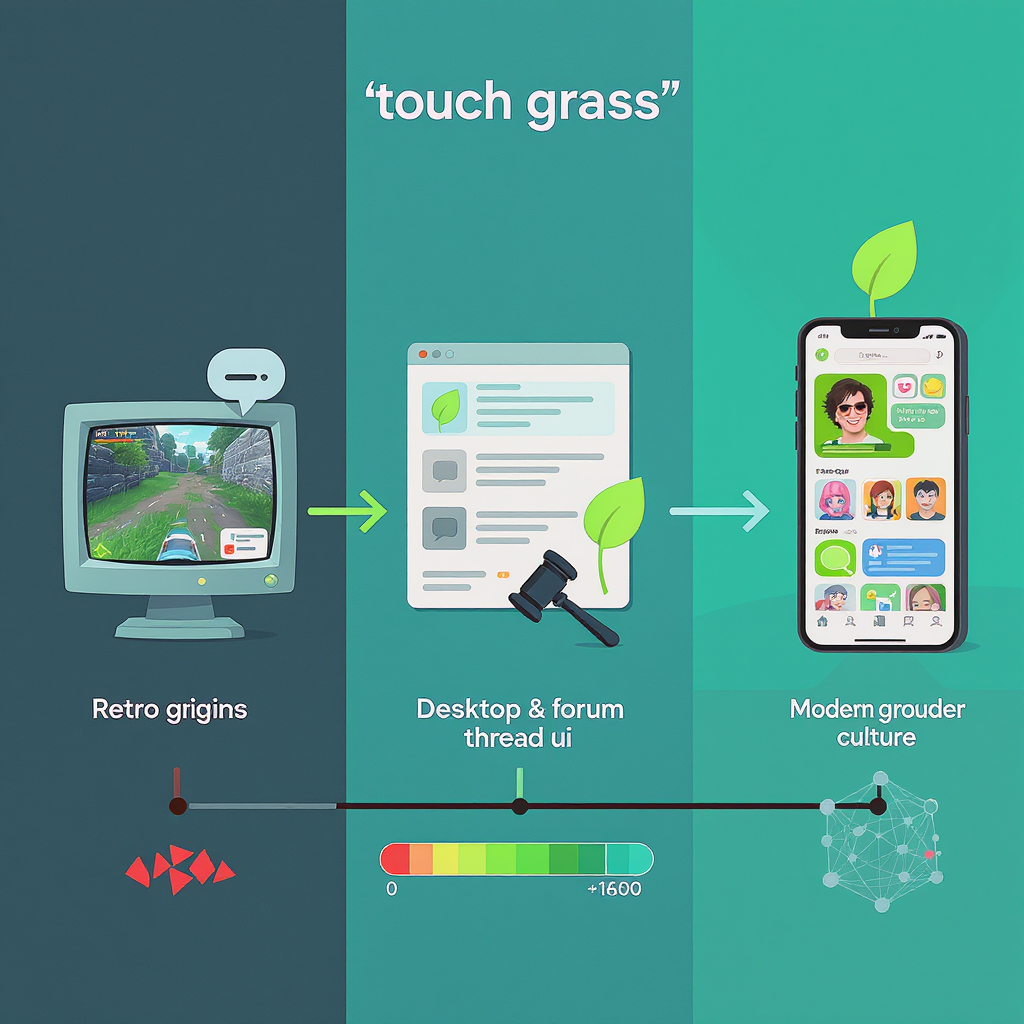
- Notification triage
- Turn off non-human pings (likes, “suggested for you,” streaks).
- Set VIP alerts for people, not platforms.
- Screen‑time limits that stick
- Use app timers with a hard stop and a second unlock step.
- Move addictive apps off your home screen.
- Algorithm cleanup
- Actively “not interested” on rage-bait.
- Follow accounts that post at humane cadences.
- Subscribe to newsletters or RSS to escape infinite feeds.
- Time‑boxed scrolling
- Decide the window before you open the app: “10 minutes while coffee brews.”
- End with a physical cue: stand, stretch, look out a window.
- Offline rituals that make disengaging easy
- Shoe-by-the-door + keys-on-hook = automatic walk.
- Book and pen by the couch = default analog reach.
- Tea or water bottle as “scroll stop” anchor.
Misconceptions and Related Slang
- Not always literal grass: the point is physical reality and sensation. Concrete, a balcony, a plant, or even an open window can serve the purpose.
- Overlaps with “log off” and “go outside”: similar energy, but “touch grass” is more meme-coded and sensory.
- Community tone differences:
- Gaming/stans: banter-heavy; often affectionate among peers.
- Politics/conspiracy threads: more combative; risks trivializing serious issues.
- Wellness circles: recast as an actual grounding technique.
Mini‑FAQ
Is saying “touch grass” rude?
It can be. Among friends, it’s often a playful nudge. In public threads, it can read as dismissive. When in doubt, try a gentler version: “Take a breather” or “Fresh air might help.”
Do you have to literally touch grass?
No. The core of what does it mean to touch grass is stepping away from the feed to reconnect with your senses. Sunlight, a walk, touching a leaf, or even gazing at distant objects through a window all count.
How do you respond if someone tells you to?
- If it’s playful and you agree: “Fair. BRB, short walk.”
- If it feels minimizing: “I’m discussing a serious issue—please don’t dismiss it,” or disengage entirely.
Should brands use this phrase?
Careful. It can look condescending or out-of-touch. If your brand encourages healthy digital habits, offer concrete tips instead of telling users to “touch grass.”
---
In a hyper-connected world, “touch grass” is a meme with a practical core: break the loop, step into your body, and return with a clearer head. Whether you literally touch grass or just catch a sliver of sky, the habit pays dividends in attention, mood, and perspective.
Summary
“Touch grass” is shorthand for leaving the feed to reset your senses and regain perspective, born from internet culture but grounded in real-world benefits. Use it playfully and carefully, avoid it in sensitive contexts, and prefer kinder prompts when unsure. Small outdoor breaks plus simple digital hygiene make the practice easy, repeatable, and effective.

